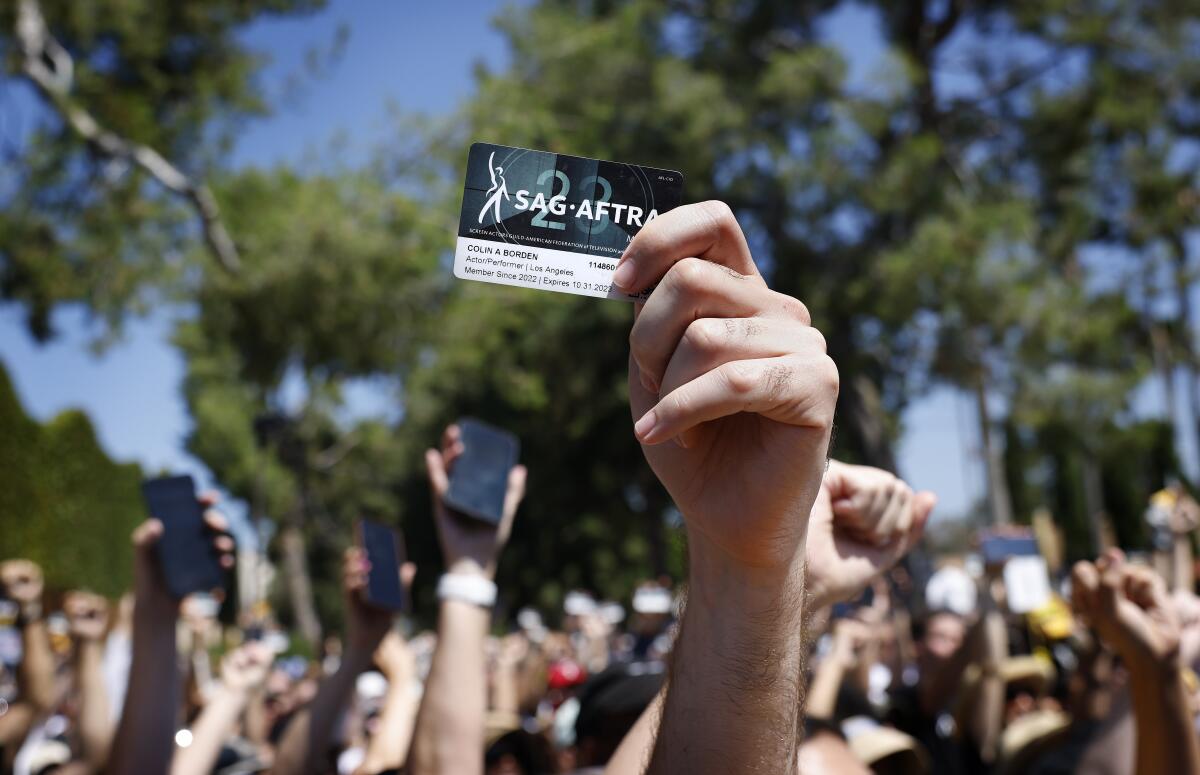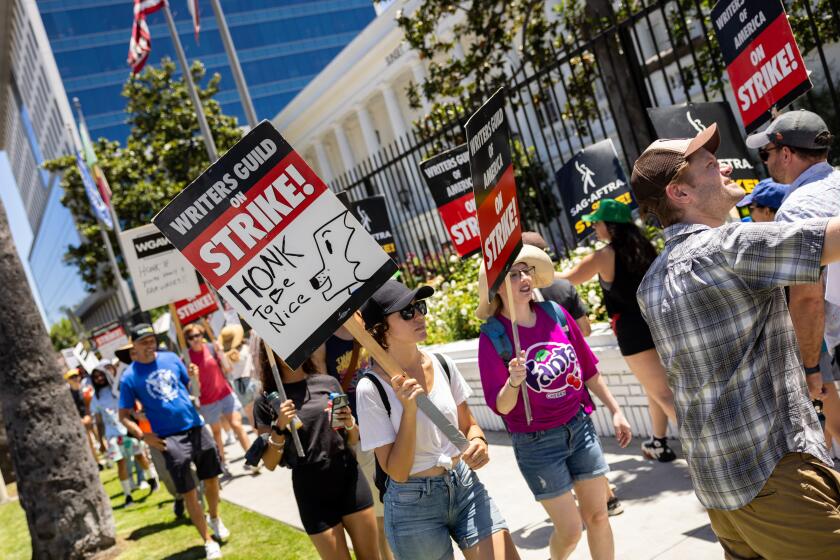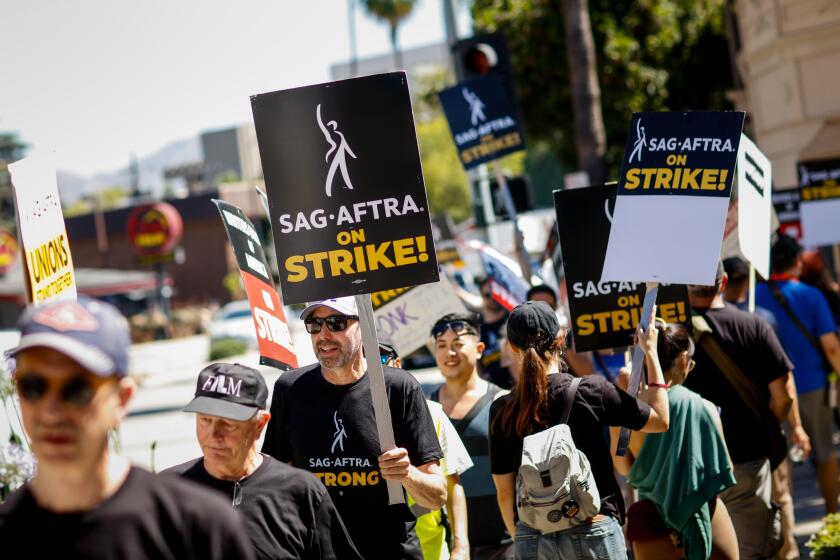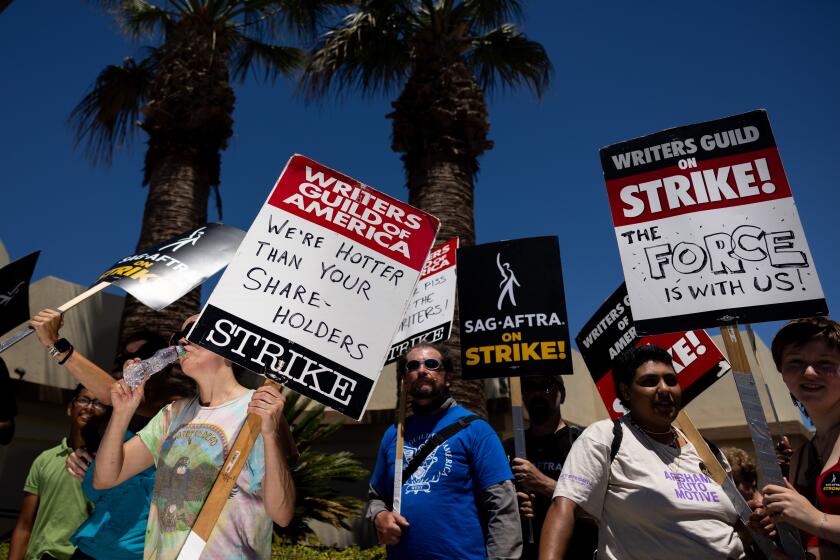Warner Bros. Discovery says strikes could cut profits by as much as $500 million

- Share via
Warner Bros. Discovery is starting to tabulate its strike pain.
The television and movie company said in a Tuesday regulatory filing that its expected profits for the year would probably be $300 million to $500 million lower than previously expected, “predominately due to the impact of the strikes.”
Warner Bros. Discovery said it now expects full-year earnings, excluding certain items, to be about $10.5 billion to $11 billion.
The company has been among those hardest hit by the labor actions. Its scripted television production has been idled and the Burbank-based Warner Bros. studio has moved the release of its highly anticipated sequel “Dune: Part Two” to next year. The company wanted to release the film in November.
Television and movie production largely shut down in May after the Writers Guild of America walked off the job. The performers’ guild, SAG-AFTRA, followed the writers in mid-July after a collapse in its talks with the Alliance of Motion Picture and Television Producers, which includes Warner Bros. Discovery, Netflix and Walt Disney Co.
Frustration, fears about the future and a high degree of mistrust continue to shape the script of Hollywood’s strikes by the WGA and SAG-AFTRA.
Talks to resolve the twin strikes have been arduous, with little movement on key issues, including the size of writers’ rooms and a residual based on viewership for streaming shows.
Earlier this summer, Warner Bros. Discovery executives told investors their financial models were based on the strikes being resolved by mid-September. That now seems unlikely, so the company provided the update on Tuesday.
“The company now assumes the financial impact to WBD of these strikes will persist through the end of 2023,” the company said in the filing.
The Warner Bros. studio scored the biggest box office hit of the summer with “Barbie,” which has generated nearly $1.4 billion in global box office receipts since its July debut, according to Box Office Mojo. The Greta Gerwig-directed movie, produced in conjunction with Mattel, is expected to help boost Warner Bros. Discovery’s third-quarter free cash flow to more than $1.7 billion, the filing said.
The company said it expects free cash flow for the year to be at least $5 billion. Improving cash flow is an important goal for the firm as it looks to pay off its hefty debt load.
Warner Bros. Discovery Chief Executive David Zaslav took heat from writers when, during an appearance on CNBC in May, he said the strikes would be resolved and writers would return to work because of “a love for the business and the love for working.”
That was nearly four months ago.

Hollywood entertainment leaders had been pushing to end the strikes by Labor Day, but the Writers Guild of America dismissed the company’s Aug. 11 offer as ““neither nothing, nor nearly enough.” The WGA said it made a counterproposal on Aug. 15. There’s been little progress since.
“WBD continues to prioritize and work diligently with other industry leadership to resolve the current WGA and SAG-AFTRA strikes in a manner that is fair and values the important work of, and partnership with, the writers and actors,” the company said in Tuesday’s filing.
As SAG-AFTRA members join writers on picket lines, the fallout will disrupt Hollywood film and TV productions worldwide. ‘There’s going to be blood in the water,’ said one analyst. ‘This will not end well.’
Producers have been eager to restart production. Executives worry that six more weeks of strikes could obliterate the entire television season and jeopardize next summer’s movie releases. There is a sense that there won’t be any production for the rest of this year unless the companies and the guilds resolve the strikes by October, according to several knowledgeable insiders.
Warner Bros. Discovery’s filing shows that some executives recognize the strikes already will weigh heavily on their fourth-quarter numbers.
Screenwriters have been walking picket lines since May 2, and there’s currently no end in sight. Actors also stopped work in mid-July, part of Los Angeles’ summer of labor strife.
Warner Bros. Discovery shares rose about 3% to $11.86 in midday trading. The stock is down nearly 20% in the last six months.
More to Read
Inside the business of entertainment
The Wide Shot brings you news, analysis and insights on everything from streaming wars to production — and what it all means for the future.
You may occasionally receive promotional content from the Los Angeles Times.














